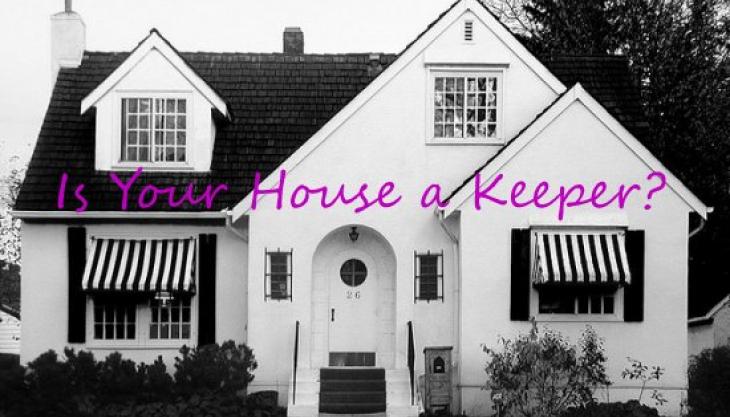Is Keeping Your House Your Best Option During Bankruptcy?
Submitted by Rachel R on Fri, 10/02/2015 - 12:26pm

Consider carefully before you keep a home during bankruptcy
Image Source: Flickr User hobvias sdoneighm
Many people initially contact a bankruptcy lawyer to discuss Chapter 7 or Chapter 13 to save their house from foreclosure. This is a primary motivator in many bankruptcy cases – however, one thing we like to encourage potential clients to consider is whether hanging on to your house is the best thing for your financial future. In some cases, trying to keep it may wreck your shot at a financial fresh start. Here are some things to consider.
#1 Can you really afford your house payment?
If you don’t make enough to keep up with your mortgage payments, keeping your house may not be wise. If more than one-third to one-fourth of your paycheck goes towards mortgage expenses, you may be in over your head. These include: mortgage payment, second mortgage or home equity line of credit, insurance, homeowner’s fees, property taxes, and maintenance.
#2 Are you behind on your mortgage?
Chapter 13 will buy you time to get caught up on past-due balances, but this won’t help if you can’t afford it. With Chapter 13, you have to pay your current payment plus a portion of your past-due. If you can’t afford your current payment, you will likely not be able to afford to catch up on what you owe – the numbers don’t align.
#3 Do you have equity in your house?
Even if there’s no equity in your home, if the payments are affordable, and you’re not too far behind, you may want to try and keep it. If you have negative equity (i.e. you owe more than the house is worth), and the house payments are unreasonable, you may want to think about walking away from the home rather than struggling and draining your finances to keep it.
#4 Is your house in disrepair?
If your house is in poor condition, this cost should be part of the financial equation when considering whether you want to keep or surrender the house. Minor cosmetic issues like out of date kitchen counters or needing a coat of paint is one thing. Major issues like a new roof, siding problems, water damage, and other structural defects that will cost tens of thousands of dollars to correct is worse.
#5 Do you have a second mortgage or HELOC?
Home equity lines of credit or second mortgages must be factored into the decision as well. With a Chapter 13 bankruptcy, if you have no equity in your home, you may be able to have a second mortgage or HELOC stripped (i.e. discharged) to reduce your total debt. In some cases, this can drastically change affordability. With a Chapter 7 you cannot strip a lien in this manner.
#6 How did you get into financial trouble?
If you had a gap in employment and are now back to work, you may be able to use Chapter 13 bankruptcy to catch up. However, if you’re still struggling to find work or are earning less than you once were, giving up a home you can’t afford and opting for Chapter 7 may be wiser. Consider the root of your financial ills and whether you’ve corrected it when making the decision to keep your home.
#7 Have your financial circumstances changed for good?
Some of our clients purchased their homes when the real estate market was in great shape, and they were earning top dollar. But the recession lowered home values, saw many people laid off, and earnings drop drastically, in some cases. If your circumstances are more modest now than when you bought your home, you may need to consider giving up your home in favor of more affordable living.
The bottom line is - you need to think about your finances now, in a few years and way down the road. If keeping your home prevents you from saving for retirement and keeps you living close to the edge of your budget, you may need to let it go for your long-term financial self-preservation. To find out more about keeping or surrendering a home in bankruptcy, contact the Law Offices of John T. Orcutt. Call +1-833-627-0115 to schedule a free North Carolina bankruptcy consultation at one of our offices in Raleigh, Durham, Fayetteville, Wilson, Greensboro or Wilmington.
Debts Hurt! Got debt? Need help? Get started below!
Serving All of North Carolina
- Bankruptcy Attorneys Raleigh NC (North)
- Bankruptcy Attorney Fayetteville NC
- Bankruptcy Attorney Durham NC
- Bankruptcy Attorneys Wilson NC
- Bankruptcy Attorneys Greensboro NC
- Bankruptcy Attorneys Southport NC
- Bankruptcy Attorneys Wilmington NC
Bankruptcy Attorneys Raleigh NC (North)
6616 Six Forks Rd #203 Raleigh, NC 27615 North Carolina
Tel: (919) 847-9750

Bankruptcy Attorney Fayetteville NC
2711 Breezewood Ave Fayetteville, NC 28303 North Carolina
Tel: (910) 323-2972

Bankruptcy Attorney Durham NC
1738 Hillandale Rd Suite D Durham, NC 27705 North Carolina
Tel: (919) 286-1695


Bankruptcy Attorneys Greensboro NC
2100 W Cornwallis Dr. STE O Greensboro, NC 27408 North Carolina
Tel: (336) 542-5993

Bankruptcy Attorneys Southport NC
116 N Howe St. Suite A Southport, NC 28461 North Carolina
Tel: (910) 218-8682

Bankruptcy Attorneys Wilmington NC
116 N. Howe Street, Suite A Southport, NC 28461 North Carolina
Tel: (910) 447-2987
